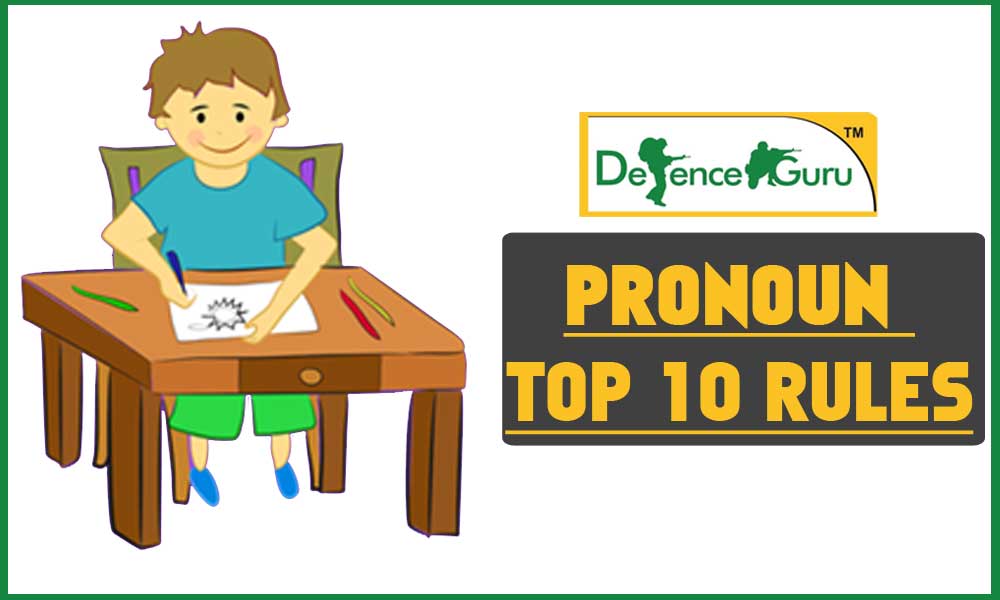PRONOUN TOP 10 RULES
RULE NO. #1: When a pronoun is used before verb then it should be in nominative case but when it is used after verb it should be in objective case. Ex: I am instructing him
Â
RULE NO. #2: The pronoun must agree with its antecedent in number, gender and person. Antecedent? An antecedent is the word, phrase, or clause that we replace with third-person personal pronouns e.g. he, she , it they etc.Â
Ex: The boy loves his Mother. ( Correct )
Everyone should take their responsibility towards cleanliness. ( Incorrect )
Everyone should take one’s responsibility towards cleanliness. ( Correct)
Â
RULE NO. #3: When nouns are joined by and If they refer to same person then pronoun for them should be Singular If they refer to different person then pronoun for them should be Plural
Ex: The Manager and Principal of the college told their vision statement. ( Incorrect )
The Manager and Principal of the college told his vision statement. ( Coorect )
Ramesh and Suresh are boasting about his rich father. ( Incorrect )
Ramesh and Suresh are boasting about their rich father. ( Correct )
Â
RULE NO. #4: The Rule of joint Pronoun 123 and 231 In case of 123/231 we never use third person plural although we use first person plural or second person plural. Preference: First Person Pronoun > Second Person Pronoun
Ex: I and he submitted their report. ( Incorrect )
I and he submitted our report. ( Correct )
You, he and I did not submit their report. ( Incorrect )
You, he and I did not submit our report. ( Correct )
We, you and they have to take stand against this problem. ( Correct )
Â
RULE NO. #5: We should use Objective Case after Let, But/except, Between, Prepositions and Like.
Ex: Let me open the door. ( correct )
I’ve received replies from everybody but him. ( correct )
I’ve received replies from everybody except him. ( correct )
Is everything fine between you and her. ( correct )
Â
RULE NO. #6: When a sentence starts with Each or Every and two singular nouns joined by and then we should use Singular pronoun only.
Ex: Every dog and horse has lost their tail. ( Incorrect )
Every dog and horse has lost its tail. ( correct )
Â
RULE NO. #7: In case of two singular nouns that are joined by either … or , neither … nor , or, we should generally use singular pronoun.( Be careful in case of joint ownership ).
Ex: Either Ramesh or Ravi has submitted their report. ( Incorrect )
Either Ramesh or Ravi has submitted his report. ( correct )
Neither Ramesh nor Ravi has brought their report. ( Incorrect )
Neither Ramesh nor Ravi has brought his report. ( correct )
Â
RULE NO. #8: When a sentence starts with It and after that any form of verb be is used then pronoun must be in nominative case.
Ex: It is me who had done this. ( Incorrect )
It is I who had done this. ( correct )
Â
RULE NO. #9: When a singular noun and a plural noun are joined by or / nor then we should use plural pronoun.
Ex: Either Ravi or his friends submitted his report. ( Incorrect )
Either Ravi or his friends submitted their report. ( correct )
Â
RULE NO. #10: After some compound conjunctions like as good as, as much as, as well as that are used for comparison we should not put objective case but use nominative case.
Ex: When it comes to give service, Ram is as good as him. ( Incorrect )
When it comes to give service, Ram is as good as he. ( correct )
Â






